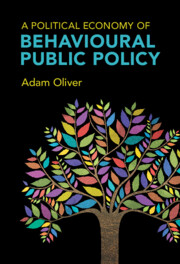Book contents
- A Political Economy of Behavioural Public Policy
- A Political Economy of Behavioural Public Policy
- Copyright page
- Dedication
- Contents
- Illustrations
- Preface
- Acknowledgements
- Introduction
- 1 Setting the Scene
- 2 Other Voices
- 3 A Kingdom of Ends
- 4 The View from Nowhere
- 5 Nourishing Flourishing
- 6 Anyone for Desert?
- 7 Private Matters
- 8 Public Matters
- 9 The Lives of Others
- 10 Summing Up
- Notes
- References
- Index
7 - Private Matters
Published online by Cambridge University Press: 16 February 2023
- A Political Economy of Behavioural Public Policy
- A Political Economy of Behavioural Public Policy
- Copyright page
- Dedication
- Contents
- Illustrations
- Preface
- Acknowledgements
- Introduction
- 1 Setting the Scene
- 2 Other Voices
- 3 A Kingdom of Ends
- 4 The View from Nowhere
- 5 Nourishing Flourishing
- 6 Anyone for Desert?
- 7 Private Matters
- 8 Public Matters
- 9 The Lives of Others
- 10 Summing Up
- Notes
- References
- Index
Summary
In this chapter, I argue that there is no role for manipulative or coercive government paternalism over the private domain of decision-making. Followers of the liberal economic tradition contend that the competitive market is the best means by which to foster social cooperation. However, I maintain that we cannot ignore the fact that the competitive market harbours significant incentives for egoism, particularly in the provision of goods and services that are associated with market failures and where there is scope to exploit the behavioural influences. That said, private decisions that impose unacceptable externalities can be regulated against if needs be, and importantly, in the realm of private decision-making, where people ought to be free to pursue their desires – which includes entering competition with others if they so wish – the need to protect autonomy outweighs the arguments to disallow the competitive market. Moreover, the competitive market offers a means to protect people from poor goods and services by there being alternative suppliers. However, I note once again that governments do have a role to play in nurturing the reciprocal instincts.
- Type
- Chapter
- Information
- A Political Economy of Behavioural Public Policy , pp. 104 - 118Publisher: Cambridge University PressPrint publication year: 2023

